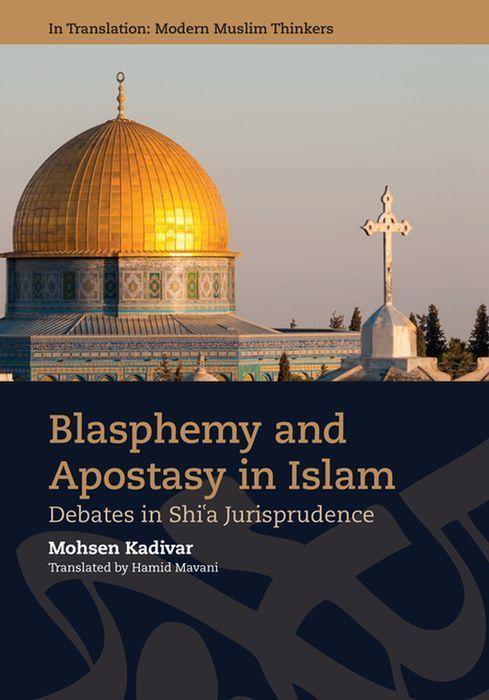129,50 €*
Versandkostenfrei per Post / DHL
Aktuell nicht verfügbar
Is it lawful to shed the blood of a man or a woman who insults the Prophet Muhammad? Does the Qu'ran stipulate a worldly punishment for apostates? Beginning with a genealogy of religious freedom in contemporary Islam, this book tells the gripping story of Rafiq Taqi, an Azerbaijani journalist and writer, who was condemned to death by an Iranian cleric for a blasphemous news article in 2006.
Delving into the most sacred sources for all Muslims - the Qu'ran and Hadith - Mohsen Kadivar explores the subject of blasphemy and apostasy from the perspective of Shi'a jurisprudence to articulate a polarisation between secularism and extremist religious orthodoxy. In a series of online exchanges, he debates the case with Muhammad Jawad Fazel, the son of Grand Ayatollah Fazel Lankarani who issued the fatwa pronouncing death penalty on Taqi. While disapproving of the journalist's writings, Kadivar takes a defensive stance against vigilante murders and asks whether death for apostasy reflects the true spirit of Islam.
Key Features
¿ Presents a back-and-forth debate between two modern Shi'a jurists (one conservative, one reformist) that locates the exact points of controversy surrounding apostasy and blasphemy
¿ Engages with the broader subjects of religious freedom and human rights, addressing both secular and religious interests
¿ Articulates the secular-religious divide and proposes a comprehensive pluralistic solution, making a case that apostasy and blasphemy are non-existent in the Qu'ran
¿ Packed with translations of primary sources, including fatwas and interviews, that allow English-speaking readers to understand the arguments advanced by both parties in the debate
Mohsen Kadivar is Research Professor of Islamic Studies in the Department of Religious Studies, Duke University. Hamid Mavani is a Persian-English translator and Associate Professor at Claremont School of Theology, Bayan Claremont.
Is it lawful to shed the blood of a man or a woman who insults the Prophet Muhammad? Does the Qu'ran stipulate a worldly punishment for apostates? Beginning with a genealogy of religious freedom in contemporary Islam, this book tells the gripping story of Rafiq Taqi, an Azerbaijani journalist and writer, who was condemned to death by an Iranian cleric for a blasphemous news article in 2006.
Delving into the most sacred sources for all Muslims - the Qu'ran and Hadith - Mohsen Kadivar explores the subject of blasphemy and apostasy from the perspective of Shi'a jurisprudence to articulate a polarisation between secularism and extremist religious orthodoxy. In a series of online exchanges, he debates the case with Muhammad Jawad Fazel, the son of Grand Ayatollah Fazel Lankarani who issued the fatwa pronouncing death penalty on Taqi. While disapproving of the journalist's writings, Kadivar takes a defensive stance against vigilante murders and asks whether death for apostasy reflects the true spirit of Islam.
Key Features
¿ Presents a back-and-forth debate between two modern Shi'a jurists (one conservative, one reformist) that locates the exact points of controversy surrounding apostasy and blasphemy
¿ Engages with the broader subjects of religious freedom and human rights, addressing both secular and religious interests
¿ Articulates the secular-religious divide and proposes a comprehensive pluralistic solution, making a case that apostasy and blasphemy are non-existent in the Qu'ran
¿ Packed with translations of primary sources, including fatwas and interviews, that allow English-speaking readers to understand the arguments advanced by both parties in the debate
Mohsen Kadivar is Research Professor of Islamic Studies in the Department of Religious Studies, Duke University. Hamid Mavani is a Persian-English translator and Associate Professor at Claremont School of Theology, Bayan Claremont.
Mohsen Kadivar is Research Professor in the Department of Religious Studies at Duke University. One of the most original and prolific figures of the Iranian reform movement, he is a versatile theologian, philosopher and intellectual historian who has written ground-breaking books on human rights and Islam, Islamic political thought, and Islamic philosophy and theology. His forthcoming 'Islamic Theocracy in the Secular Age' will be published by the University of North Carolina Press in 2021. Kadivar has been a vocal critic of Iran's doctrine of clerical rule and a strong advocate of democratic and liberal reforms in Iran as well as constructional reform in shari'a and Shi'a theology. He has served time in prison in Iran for his political activism and beliefs; his writings have been banned in Iran since 2009.
Hamid Mavani is Associate Professor of Islamic Studies at Bayan Claremont Islamic Graduate School and author of Religious Authority and Political Thought in Twelver Shi'ism: From Ali to Post Khomeini (Routledge, 2013) and co-author, with Ahmad Kazemi Moussavi, of Islamic Legal Methodology: A New Perspective (forthcoming in 2020).
Introduction
- Literature Review of Religious Freedom and Apostasy in Contemporary Sunni Islam
- Literature Review of Religious Freedom and Apostasy in Contemporary Shi'i Islam
- The Genealogy of the Book's Ideas and Its Merits
Part I: Apostasy and Blasphemy
The Background of the Treatise
- Legal Ruling on Assassination by Lankarani Sr. and Statement of Delight by Lankarani Jr. at its Implementation
- Objections to the Fatwa of Assassination - by Kadivar
- Response to Doubts Surrounding Apostasy - by Lankarani Jr.
Treatise on Refuting the Punishment for Apostasy and Blasphemy - by Kadivar
- Issuing a ruling on the death penalty by a process that falls outside the sphere of a competent court will engender lawlessness and anarchy
- Claiming the validity of the death penalty for apostasy and blasphemy is based on one deficient 'isolated report' (khabar al-wa¿id).
- Refuting the claim that most of the hadiths on apostasy are 'mutawatir'
- Refuting the claim of consensus (ijma') and the necessity to implement the death penalty for apostasy and blasphemy
- No one, during the time of the Prophet, Imam Ali, and the other Imams, was sentenced to death solely for apostasy
- The Absolute Cessation of the ¿udud Punishments or those that Necessitate Death Penalty and Injury, and Suspension During the Time of the Imam's Occultation
- 'Isolated reports' (khabar al-wa¿id) are non-probative in matters of critical importance
- Issuing fatwas on killing an apostate or a blasphemer weakens and tarnishes Islam
- Alteration of the subject of apostasy and objecting to the perpetual applicability of the death penalty for apostasy and blasphemy
- The incompatibility of executing an apostate or a blasphemer with explicit Qur'anic verses
Appendix 1. A Further Clarification to Lankarani Jr.'s Position
Appendix 2. Rafiq Taqi in His Own Words and in the Words of His Defenders
Part II: Freedom of Expression and Hate Speech - by Kadivar
- Islam: Between Freedom of Expression and Hate Speech
- Letter of Censure to the Jurists Who Issued the Latest Judgement on Apostasy
- Insulting the Prophet is a Form of Hate Speech
- Request for Clarification from the Jurists Who Defend 'Suffocating the Religionists'
Appendix 3: Imam[Ali]: Political Leader or Exemplary Role Model - by A. Gharavi
Glossary; Bibliography; Index
About the Contributors
| Erscheinungsjahr: | 2021 |
|---|---|
| Genre: | Religion & Theologie |
| Religion: | Nichtchristliche Religionen |
| Rubrik: | Geisteswissenschaften |
| Medium: | Buch |
| Seiten: | 432 |
| ISBN-13: | 9781474457576 |
| ISBN-10: | 1474457576 |
| Sprache: | Englisch |
| Einband: | Gebunden |
| Autor: | Kadivar, Mohsen |
| Übersetzung: | Mavani, Hamid |
| Hersteller: | Edinburgh University Press |
| Maße: | 216 x 140 x 24 mm |
| Von/Mit: | Mohsen Kadivar |
| Erscheinungsdatum: | 13.04.2021 |
| Gewicht: | 0,644 kg |
Mohsen Kadivar is Research Professor in the Department of Religious Studies at Duke University. One of the most original and prolific figures of the Iranian reform movement, he is a versatile theologian, philosopher and intellectual historian who has written ground-breaking books on human rights and Islam, Islamic political thought, and Islamic philosophy and theology. His forthcoming 'Islamic Theocracy in the Secular Age' will be published by the University of North Carolina Press in 2021. Kadivar has been a vocal critic of Iran's doctrine of clerical rule and a strong advocate of democratic and liberal reforms in Iran as well as constructional reform in shari'a and Shi'a theology. He has served time in prison in Iran for his political activism and beliefs; his writings have been banned in Iran since 2009.
Hamid Mavani is Associate Professor of Islamic Studies at Bayan Claremont Islamic Graduate School and author of Religious Authority and Political Thought in Twelver Shi'ism: From Ali to Post Khomeini (Routledge, 2013) and co-author, with Ahmad Kazemi Moussavi, of Islamic Legal Methodology: A New Perspective (forthcoming in 2020).
Introduction
- Literature Review of Religious Freedom and Apostasy in Contemporary Sunni Islam
- Literature Review of Religious Freedom and Apostasy in Contemporary Shi'i Islam
- The Genealogy of the Book's Ideas and Its Merits
Part I: Apostasy and Blasphemy
The Background of the Treatise
- Legal Ruling on Assassination by Lankarani Sr. and Statement of Delight by Lankarani Jr. at its Implementation
- Objections to the Fatwa of Assassination - by Kadivar
- Response to Doubts Surrounding Apostasy - by Lankarani Jr.
Treatise on Refuting the Punishment for Apostasy and Blasphemy - by Kadivar
- Issuing a ruling on the death penalty by a process that falls outside the sphere of a competent court will engender lawlessness and anarchy
- Claiming the validity of the death penalty for apostasy and blasphemy is based on one deficient 'isolated report' (khabar al-wa¿id).
- Refuting the claim that most of the hadiths on apostasy are 'mutawatir'
- Refuting the claim of consensus (ijma') and the necessity to implement the death penalty for apostasy and blasphemy
- No one, during the time of the Prophet, Imam Ali, and the other Imams, was sentenced to death solely for apostasy
- The Absolute Cessation of the ¿udud Punishments or those that Necessitate Death Penalty and Injury, and Suspension During the Time of the Imam's Occultation
- 'Isolated reports' (khabar al-wa¿id) are non-probative in matters of critical importance
- Issuing fatwas on killing an apostate or a blasphemer weakens and tarnishes Islam
- Alteration of the subject of apostasy and objecting to the perpetual applicability of the death penalty for apostasy and blasphemy
- The incompatibility of executing an apostate or a blasphemer with explicit Qur'anic verses
Appendix 1. A Further Clarification to Lankarani Jr.'s Position
Appendix 2. Rafiq Taqi in His Own Words and in the Words of His Defenders
Part II: Freedom of Expression and Hate Speech - by Kadivar
- Islam: Between Freedom of Expression and Hate Speech
- Letter of Censure to the Jurists Who Issued the Latest Judgement on Apostasy
- Insulting the Prophet is a Form of Hate Speech
- Request for Clarification from the Jurists Who Defend 'Suffocating the Religionists'
Appendix 3: Imam[Ali]: Political Leader or Exemplary Role Model - by A. Gharavi
Glossary; Bibliography; Index
About the Contributors
| Erscheinungsjahr: | 2021 |
|---|---|
| Genre: | Religion & Theologie |
| Religion: | Nichtchristliche Religionen |
| Rubrik: | Geisteswissenschaften |
| Medium: | Buch |
| Seiten: | 432 |
| ISBN-13: | 9781474457576 |
| ISBN-10: | 1474457576 |
| Sprache: | Englisch |
| Einband: | Gebunden |
| Autor: | Kadivar, Mohsen |
| Übersetzung: | Mavani, Hamid |
| Hersteller: | Edinburgh University Press |
| Maße: | 216 x 140 x 24 mm |
| Von/Mit: | Mohsen Kadivar |
| Erscheinungsdatum: | 13.04.2021 |
| Gewicht: | 0,644 kg |








